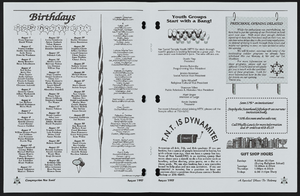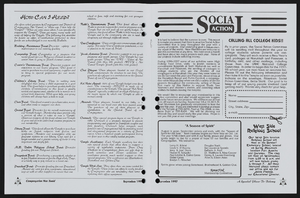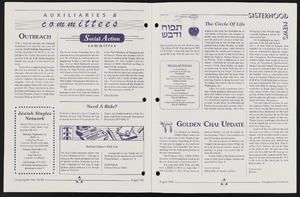Search the Special Collections and Archives Portal
Search Results

Transcript of interview with David Wasserman by Barbara Tabach, October 21, 2016
Date
Archival Collection
Description
For nearly two decades between 1950 and 1970, only one dentist of Jewish ancestry was known to be licensed to practice in Nevada. That was Dr. Joe Chenin. Finally, in 1971, the steadfast and easy mannered Dr. David R. Wasserman (1944 - ) broke through the barrier to become the second Jewish dentist serving the Las Vegas community. Over the following years, Dr. Wasserman built a sizeable following and immersed himself in the Jewish community of Las Vegas. Among his achievements is his participation and leadership in the formation of Las Vegas’ first Reform Jewish synagogue, Congregation Ner Tamid. He also would be active in the Jewish Federation. In 1992, as the HIV-AIDS epidemic affected dental offices throughout the nation, Dr. Wasserman saw an opportunity to get ahead of the infection. With the help of his wife Juanita Davis-Wasserman and his father-in-law Warren Davis, he developed, patented, manufactured and distributed a disposable tip for a treatment instrument commonly found in dental offices called a tri-syringe. This disposable tip brought sanitary options and great financial fortune to Dr. Wasserman and his family. In this oral history, Dr. Wasserman reflects on his joy of living in Las Vegas. He is a highly regarded dentist and leader in the Jewish community.
Text

Transcript of interview with Walter Dane by Ann Clark, March 11, 1978
Date
Archival Collection
Description
On March 11, 1978, Ann K. Clark interviewed her step grandfather, tire repairman Walter Dane, (born August 10th, 1914 in West Barnett, Vermont) in her, the interviewer’s, home in North Las Vegas. Also present during the interview is the interviewer’s mother, Marie Dane. Walter relocated to Indian Springs in 1930 before settling in Las Vegas in 1943. In 1968 he moved to Utah, where he resided at the time of this interview. Well-traveled, Walter discusses his many moves over the years. Ultimately, this interview covers the growth and development of the Las Vegas and Indian Springs areas.
Text

Transcript of interview with Edward "Eddie" Anderson by Dennis McBride, October 11-14, 2000
Date
Archival Collection
Description
Dennis McBride interviews Eddie Anderson (born 1946) about his role in advocating for LGBT rights, specifically his participation in the various political and social movements during previous decades. The interview begins with a discussion of Anderson’s background, including his experiences growing up in children’s homes and living with his grandparents. Anderson mentions marching with his grandparents for both workers’ and women’s rights as some of his first political involvements. Anderson also discusses his original aspirations for becoming a priest as well as his memories of meeting President John F. Kennedy during a visit to his high school when Anderson was student body president. Anderson then discusses travelling to the South, specifically in Selma, Alabama, during one summer while in high school in order to help register Black voters. Anderson then discusses his friendship with Nevada Senator Bill Raggio and his wife, and his joining of the U.S. Navy, where he met President Ri
Text

Transcript of interview with Norma Morrow Zuckerman by Barbara Tabach, April 18, 2016 & March 13, 2017
Date
Archival Collection
Description
Norma Morrow Zuckerman is the driving force behind the Jewish Repertory Theatre of Nevada [JRTN], an organization she co-founded with Charlene Sher in 2010. The endeavor coincided with Norma’s pursuit of an MFA at UNLV a couple of years prior. With the commitment to her studies and to bring professional Jewish theatrical performances to Las Vegas, her energetic personality intensified. In 2007, she performed in The Diary of Anne Frank and noted the audience was supporting Jewish Family Services Agency. Norma could sense the community’s eagerness for professional theatre and she was just the one to deliver it. Over the following years, JRTN produced an array of Jewish-themed and acted plays. Since then she tries to bring The Diary of Anne Frank to the stage annually and finds partners to bring 1400 eighth graders to the performance. By 2012, her commute between Los Angeles, where she is a garment designer/manufacturer with her husband Eugene, and Las Vegas had become routine and her passion for professional theatre in Las Vegas increased. This was the year that The Smith Center for Performing Arts opened. The first theatrical production was Golda’s Balcony, a one-woman drama starring Tovah Feldshuh. It was the spectacular co-promotion by Norma’s JRTN and the Smith Center. Norma was smitten with the theatre from a young age and studied with some of the best acting coaches—Milton Kastelas, Stella Adler, Wynn Handman. In this oral history she recalls the people who have helped her, the performances that have charmed audiences and the value of live theatre.
Text

Nery Martinez interview, December 6, 2018: transcript
Date
Description
Interviewed by Laurents Bañuelos-Benitez. Nery Martinez was born in El Salvador, he describes his childhood as one filled with war and violence. When Martinez was five years old, the small country of El Salvador erupted in civil war. Martinez describes the panic that he saw growing up, never being certain when violence could occurred. The 12 year war took up the entirety of Martinez's childhood. After the war, the country was left in runes, seeing little hope for recovery, Martinez left El Salvador for Las Vegas where his brothers had fled earlier during the war. In Las Vegas, Martinez was able to find work in the service industry, at the same time attending English classes at night. Martinez is currently working as a bartender within the Culinary Union. Interview conducted in Spanish.
Text





